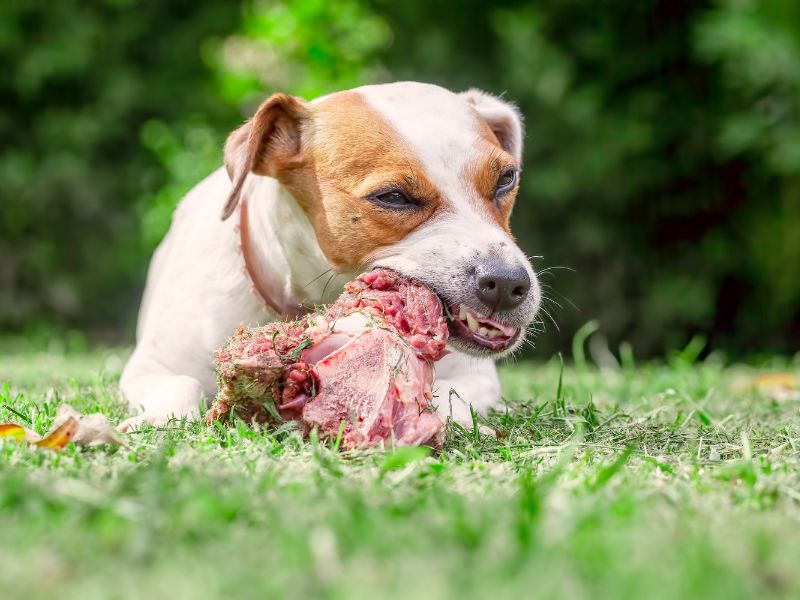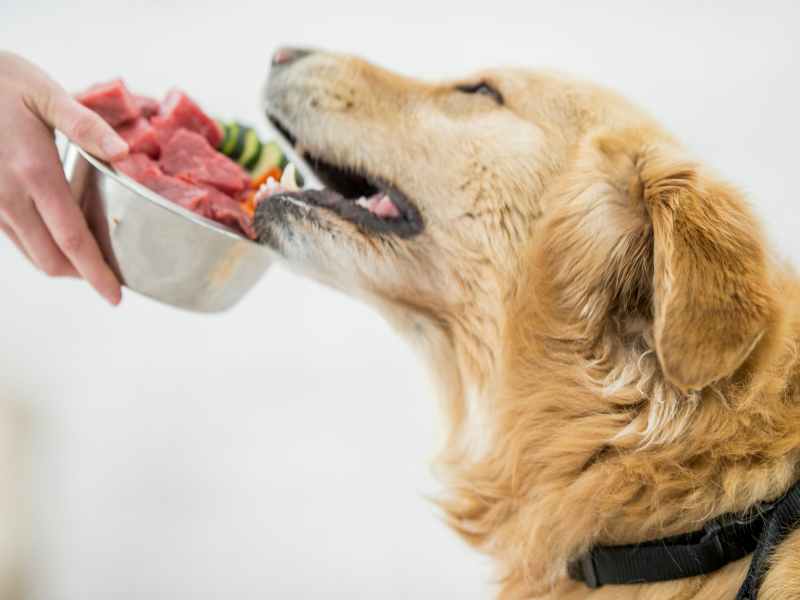It’s all about gut health, as gut health leads to better overall health. That’s why you may consider switching your dog to a raw diet. If you’ve ever thought about it, we’ve got some info on the benefits of gut health and a raw food diet for your dog.
At Bernie’s Best, we know the health of your dog depends a lot on what their gut health is like. When we created Perfect Poop, we did so with the intention of helping our dogs, Bernie and Lady, have the best gut health they could. In consulting with experts and researching how to keep them their healthiest, we also looked into transitioning them to a raw diet.
What is a raw food diet for dogs?
Raw diets, or raw dog food diets, are also known as BARF diets. They’re ‘biologically appropriate raw foods’ and they can be a great way to nourish your dog’s gut health and his overall health. There are different types of raw dog food diets, with some being wholly raw foods similar to what your dog might come across in the wild and others being mixes of the two foods, kibble with raw ingredients, for extra nutrients.
Raw diets are feeding routines that consist in part or whole of raw meat, bones, and vegetables. Many who feed dogs a raw diet also include supplements for maximum nutrient absorption.
Generally speaking, raw diets for dogs are thought to be the closest way to resemble what dogs’ wolf ancestors may have eaten and are a biologically responsive way to eat a similar diet. Keep in mind that your dog’s digestive system was designed for raw food, not processed food.
Why should I consider switching my dog to raw diet?
There are lots of reasons for transitioning dogs from processed foods to raw diets. Many pet parents and experts believe that dogs’ raw diets can help increase energy levels, make their coats and fur nice and healthy and support their overall health.
This is thought to be because dogs may more easily digest raw diets and this means more nutrient absorption. Optimal nutrient absorption can help boost their immune system and also decrease digestive issues like constipation, gas, diarrhea and more.
Other pet owners switch dogs to raw diets because they’re simply concerned about the ingredients in many of the traditional kibble dog foods. Dogs Naturally Magazine highlights that too many dry kibbles have questionable ingredients, fillers, preservatives and other additives that may not lend themselves to your dog’s optimal health. It might be compared to junk food which is neither healthy to feed every meal nor necessary for your dog’s body.
This isn’t just in less expensive kibble dog foods, either. Many high-end and expensive brands have more filler ingredients than anything else, and if your dog cannot obtain nutrients from the food you feed, their gut health and overall health will likely suffer. You may be paying for food that just isn’t as nutritious as you may think it is. Raw dog food diets are often thought to be healthier options as there is more whole food content for your dog to digest.
Additionally, some dog owners prefer raw feeding because they seem more species-specific and have appropriate forms of nutrition. Commercial dog foods are typically cooked at high heats and processed in ways that destroy much of the nutrients. Raw ingredients preserve the nutrients and allow them to be more easily digested by your dog.

Because a raw dog food diet include bones that are rich in calcium, they can also add benefits in improving your dog’s dental health. Chewing the raw bones can help scrape tartar and plaque off their teeth. Keeping your dog’s teeth free from both of those can reduce their risk of coming down with gum disease or the loss of teeth.
What to expect during the transition period
When switching your dog’s food from eating kibble or dry food to raw food, there’s a transition process that has to be taken into consideration. This so-called detox process can last from one or two days to a few weeks, or even several months.
Many dogs need time to adjust their transitioning to raw food. That’s why we have to be extra patient with older dogs that have been eating a processed diet for a long period of time, they’ll probably need a slow transition period and a more gradual switch to their new food. Adult dogs normally need at least a week to adapt, but in all cases, a slow switch it’s always a great idea. Your dog’s water intake might decrease during this process as it will be consuming moisture dense meals. But you should still make sure that your pup has access to clean, filtered drinking water even if it drinks less.
In terms of symptoms, during this detox period from their old food to a new diet, most dogs suffer from loose stools, flatulence, vomits and bad breath. This a natural process that’s normal when you transition your dog to raw food. Their stomach and digestive tract need to adjust to their new diet. If your dog has bad breath in general, then it might be a sign of poor digestion or gut health.
Concerns About Raw Diets For Dog
While transitioning to a raw diet for dogs may have benefits, there are some concerns dog parents have. One is that though bones may be good for teeth, you have to be careful because some may splinter and/or cause injuries or even choking. It’s thought that feeding raw bones appropriate to your dog’s breed and size is best. Many raw feeders use bone meal as a bone replacement for their small dogs. You may also see that the bone content in your dog’s new food may account for a white, soft stool. That’s not something to be worried about.
Other concerns arise when you don’t check with your vet before switching a dog to a raw diet. It’s important to make sure your dog gets the right amount of nutrients, vitamins, amino acids, minerals, protein, fiber and more.
While dry kibble may be highly processed, it is formulated to offer an appropriate balance of nutrition. With raw diets for dogs, that may be hit or miss if you don’t ensure the balance of nutrients in the food. For example, organ meat such as brain, liver, heart, or green tripe is an essential part of your dog’s diet but you should be careful with the amount and observe your dog’s reaction and tolerance.
Raw diets also carry concern because raw meat can carry bacteria like E. coli and salmonella, both of which can be harmful to your dog and to you. When switching to raw dog food you want to be sure to wash your hands and the surfaces the food touches thoroughly after handling. Raw dog food can be stored in the freezer and then thawed in the refrigerator instead of room temperature to help prevent bacteria from forming.
In addition, other factors such as overall health condition and age of your pup should be considered when transitioning to raw meal. Although it might be a relatively smooth process for healthy dogs as their transition process may be shorter, senior dogs may need several weeks to adjust.
Do raw dog food diets help gut health?
People switch their dog to raw diets because they’re looking to support their gut health and want their dogs to have a healthier digestive system.
Raw meat has enzymes that help break food down to the smallest particles for absorption. This helps support healthy and efficient digestion, which strengthens gut health.
Additionally, raw meat contains probiotics. Probiotics are good gut bacteria that support immune systems. Adding raw ground meat to your dog’s diet adds these beneficial bacteria, which helps keep your dog’s microbiome balanced.
What if you don’t want to switch your dog to a raw diet?
There may be many benefits to switching a dog to a raw diet, but many dog parents find that it is more expensive and perhaps not cost-effective for their budgets. Or they just can’t prepare nutritionally balanced meals and switch to a cooked diet as regularly as their dog needs. Some people are put off by the health concerns of foodborne illness, or the worry about the potential for injury with bone splinters.
Not everyone finds raw diets as convenient as traditional dry kibble as dry kibble can be stored for long times and doesn’t require preparation ahead of time.
Some people prefer not to switch their dog to raw diet because their vet is not on board.
If you’d like the benefits of better gut health, but aren’t sure about a raw diet for your dog right now, the good news is that there are options for supplementing your dog’s gut health.
Adding Bernie’s Perfect Poop to each of your dog’s meals can add premium fiber, pre- and probiotics and digestive enzymes. Perfect Poop is delicious with two formulas, and a quick, convenient and cost-effective way to help your dog digest his food better and build a stronger gut. The probiotics in Perfect Poop are specifically chosen to withstand the harsh environment of your dog’s stomach and supplement as some commercial foods aren’t able to because of their high-heat processing.
Most importantly, we created Perfect Poop because we love our dogs as much as you love yours. We’re always looking for how to help them live their healthiest, happiest lives, and keeping their gut in great shape is the best way to do it.


